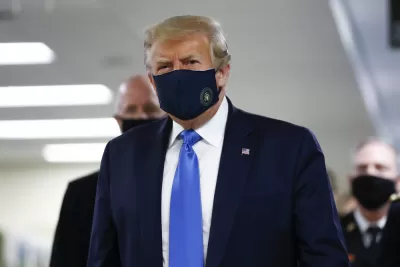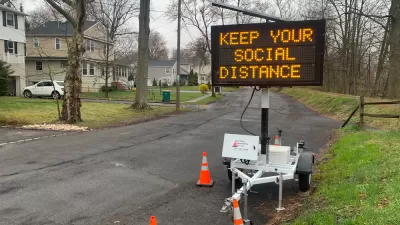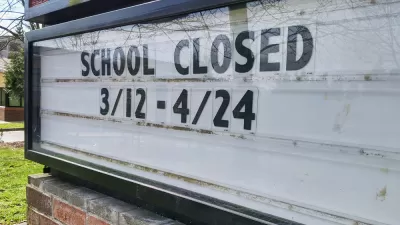A trio of epidemiologists from Stanford, Harvard, and the University of Oxford have joined the president's new coronavirus medical advisor, Scott Atlas, in promoting an alternative approach to dealing with coronavirus infections.

Political rallies
"At the rally held Monday night in Florida, attendees stood shoulder to shoulder," wrote Nicholas Florko for STAT on Oct. 13. "The lack of social distancing protocols stands in start contrast to his challenger, Joe Biden, who typically requires attendees to sit in their own 'bubbles' far away from other attendees."
Focused Protection
Bhattacharya, Gupta, and Kulldorf "have codified their argument in the form of a document posted online that called itself the Great Barrington Declaration, named after the town in Massachusetts where it was unveiled on Oct. 4 in a ceremony at a libertarian think tank," adds Achenbach.
The authors argue that their approach would decrease the undesirable public health effects of restrictions and closures, which disproportionately affect lower-income people. The declaration does not mention wearing masks, engaging in social distancing, avoiding crowds and indoor environments, or any of the other recommendations pushed by most government and scientific experts.
The declaration, which has 35 signatures on the homepage, describes their approach:
The most compassionate approach that balances the risks and benefits of reaching herd immunity, is to allow those who are at minimal risk of death to live their lives normally to build up immunity to the virus through natural infection, while better protecting those who are at highest risk. We call this Focused Protection.
Those who are not vulnerable should immediately be allowed to resume life as normal. Simple hygiene measures, such as hand washing and staying home when sick should be practiced by everyone to reduce the herd immunity threshold.
By following this approach, President Trump and Gov. Ron DeSantis, R-Fla. (the latter signed an executive order last month lifting all remaining statewide coronavirus-related restrictions on businesses including bars and restaurants) can dispense with the five public health measures, with the exception of hand hygiene, that public health experts like Anthony Fauci, director of the National Institutes of Health’s National Institute of Allergy and Infectious Diseases, have been urging Americans to practice to mitigate community spread of the virus that has infected almost 8 million Americans since February.
Herd immunity
"Many experts say 'herd immunity' — the point at which a disease stops spreading because nearly everyone in a population has contracted it — is still very far off," wites Sheryl Gay Stolberg for The New York Times in her report on the White House call on Oct. 12 that discussed the Great Barrington Declaration.
Leading experts have concluded, using different scientific methods, that about 85 to 90 percent of the American population is still susceptible to the coronavirus.
William Haseltine, chair and president of ACCESS Health International and a former professor at Harvard Medical School and Harvard School of Public Health, told CNN that "herd immunity (for COVID-19 achieved by natural infection) is another word for mass murder." He added, “we are looking at two to six million Americans dead – not just this year but every year.”
Related in Planetizen:
-
The Great Scandinavian Pandemic Experiment, May 13, 2020
-
The 1854 Map That Transformed Public Health in Urban Areas, November 11, 2017
Hat tip to Angela Fritz who writes The Washington Post Coronavirus Updates newsletter.
FULL STORY: Proposal to hasten herd immunity to the coronavirus grabs White House attention but appalls top scientists

Study: Maui’s Plan to Convert Vacation Rentals to Long-Term Housing Could Cause Nearly $1 Billion Economic Loss
The plan would reduce visitor accommodation by 25,% resulting in 1,900 jobs lost.

Alabama: Trump Terminates Settlements for Black Communities Harmed By Raw Sewage
Trump deemed the landmark civil rights agreement “illegal DEI and environmental justice policy.”

Why Should We Subsidize Public Transportation?
Many public transit agencies face financial stress due to rising costs, declining fare revenue, and declining subsidies. Transit advocates must provide a strong business case for increasing public transit funding.

Paris Bike Boom Leads to Steep Drop in Air Pollution
The French city’s air quality has improved dramatically in the past 20 years, coinciding with a growth in cycling.

Why Housing Costs More to Build in California Than in Texas
Hard costs like labor and materials combined with ‘soft’ costs such as permitting make building in the San Francisco Bay Area almost three times as costly as in Texas cities.

San Diego County Sees a Rise in Urban Coyotes
San Diego County experiences a rise in urban coyotes, as sightings become prevalent throughout its urban neighbourhoods and surrounding areas.
Urban Design for Planners 1: Software Tools
This six-course series explores essential urban design concepts using open source software and equips planners with the tools they need to participate fully in the urban design process.
Planning for Universal Design
Learn the tools for implementing Universal Design in planning regulations.
Smith Gee Studio
Alamo Area Metropolitan Planning Organization
City of Santa Clarita
Institute for Housing and Urban Development Studies (IHS)
City of Grandview
Harvard GSD Executive Education
Toledo-Lucas County Plan Commissions
Salt Lake City
NYU Wagner Graduate School of Public Service





























